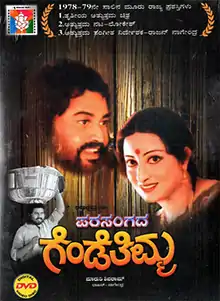Parasangada Gendethimma
Parasangada Gendethimma (transl. Actor-singer Gendethimma) is a 1978 Indian Kannada-language drama film directed by Maruthi Shivram, based on a novel of the same by Srikrishna Alanahalli.[1] It stars Lokesh in the lead role and the supporting cast features Reeta Anchan, B. R. Jayaram, and Ramakrishna.
| Parasangada Gendethimma | |
|---|---|
 DVD cover | |
| Kannada | ಪರಸಂಗದ ಗೆಂಡೆತಿಮ್ಮ |
| Directed by | Maruthi Shivram |
| Produced by | Honnaiah and others |
| Screenplay by | Maruthi Shivram |
| Based on | Parasangada Gendethimma by Srikrishna Alanahalli |
| Starring | Lokesh Reeta Anchan Manu Honnaiah |
| Music by | Rajan-Nagendra |
| Cinematography | S. Ramachandra |
| Edited by | J. Stanly |
| Distributed by | Kalakshethra |
Release date |
|
Running time | 139 minutes |
| Country | India |
| Language | Kannada |
The film won three awards at the 1978–79 Karnataka State Film Awards – Third Best Film, Best Actor (Lokesh) and Best Music Director (Rajan-Nagendra). The film was remade in Tamil in 1979 as Rosaappo Ravikkai Kaari and in Telugu in 1982 as Kotha Neeru.[2]
Plot
Thimanna (Lokesh) is an innocent tribal youth who is excited about his wedding. A salesman in village who help villagers by getting their needy items from distant city, His wedding is arranged with Marakani (Reeta Anchan), a city girl. Marakani wants to bring about a huge change in him and make him a decent city man. Meanwhile, due to the differences with her mother-in-law, Marakani manages to separate herself and Thimanna from his mother, and they start living separately. Later in the process, when an innocent Thimanna invites a teacher (Manu) to his new shed where they live, Marakani gets attracted to him due to his sophisticated city man looks and then the plot revolves around Thimanna's point of view of the whole situation.
Cast
- Lokesh as Gendethimma
- B. R. Jayaram
- Reeta Anchan ( Voice dubbed by B. Jayashree )
- Honnaiah
- Manu
- Shyamala
- Pramila
Soundtrack
The music for the film was composed by Rajan-Nagendra, with lyrics by Doddarange Gowda.
Track list
| # | Title | Singer(s) |
|---|---|---|
| 1 | "Notadage Nageya Meeti" | S. P. Balasubrahmanyam |
| 2 | "Thera Eri Ambaradaage" | S. P. Balasubrahmanyam |
| 3 | "Ninna Roopu Edeya Kalaki" | S. Janaki |
| 4 | "Notadage Nageya Meeti" (Sad) | S. P. Balasubrahmanyam |
References
- "A writer ahead of his time". Bangalore Mirror. 11 October 2013. Retrieved 8 May 2014.
- http://timesofindia.indiatimes.com/entertainment/kannada/movies/Top-ten-Kannada-films-to-have-been-remade/photostory/27975141.cms